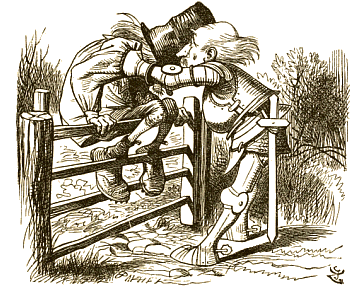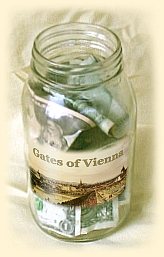
Summer Fundraiser 2014, Day Seven
As you all know by now, the theme of this week’s fundraiser is “Curators at the Crossroads”, with me doing the curating and Dymphna looking out at our crossroads. I’ve been attempting all week to explain what my job here involves, and have had a tough time of it — it really is difficult to describe.
 So I’ll just let it go. Readers who have been around long enough already know what I do, and what Dymphna does, and why we are asking for donations to help us keep going. To those of you who just got here: Stick around! You’ll soon find out.
So I’ll just let it go. Readers who have been around long enough already know what I do, and what Dymphna does, and why we are asking for donations to help us keep going. To those of you who just got here: Stick around! You’ll soon find out.
Since today is the last day of the fundraiser, I’ll spare you one more explanation of what Being Baron Bodissey means, and let Lewis Carroll do the explaining instead.
As Dymphna mentioned last night, I like to read poetry, and the poems of Lewis Carroll (a.k.a. Charles Dodgson) are among my favorites. The following poem from Through the Looking-Glass is variously identified as “Haddocks’ Eyes”, “The Aged Aged Man”, “Ways and Means”, and “A-sitting on a Gate” by the White Knight, who performs it for Alice.
It’s actually a satire of a poem called “Resolution and Independence” by William Wordsworth. Many of Carroll’s best-known verses were satires of poems that were popular during Victorian times, but have since fallen into obscurity. All that we have left is the humorous echo of them, preserved by the genius of Charles Dodgson.
In the following piece, I play the part of the old man on the gate, while you, our loyal readers, get to hector me for an explanation of what I do whilst thumping me on the head.
On the other hand, the role of the White Knight might also suit me — since he keeps hatching absurd schemes in his head so that he can’t pay attention to anything the old man says.
Here we go:
I’ll tell thee everything I can:
There’s little to relate.
I saw an aged aged man,
A-sitting on a gate.
“Who are you, aged man?” I said,
“And how is it you live?”
And his answer trickled through my head,
Like water through a sieve.He said “I look for butterflies
That sleep among the wheat:
I make them into mutton-pies,
And sell them in the street.
I sell them unto men,” he said,
“Who sail on stormy seas;
And that’s the way I get my bread —
A trifle, if you please.”But I was thinking of a plan
To dye one’s whiskers green,
And always use so large a fan
That they could not be seen.
So, having no reply to give
To what the old man said,
I cried “Come, tell me how you live!”
And thumped him on the head.His accents mild took up the tale:
He said “I go my ways,
And when I find a mountain-rill,
I set it in a blaze;
And thence they make a stuff they call
Rowlands’ Macassar-Oil —
Yet twopence-halfpenny is all
They give me for my toil.”But I was thinking of a way
To feed oneself on batter,
And so go on from day to day
Getting a little fatter.
I shook him well from side to side,
Until his face was blue:
“Come, tell me how you live,” I cried,
“And what it is you do!”
He said “I hunt for haddocks’ eyes
Among the heather bright,
And work them into waistcoat-buttons
In the silent night.
And these I do not sell for gold
Or coin of silvery shine,
But for a copper halfpenny,
And that will purchase nine.“I sometimes dig for buttered rolls,
Or set limed twigs for crabs:
I sometimes search the grassy knolls
For wheels of Hansom-cabs.
And that’s the way” (he gave a wink)
“By which I get my wealth —
And very gladly will I drink
Your Honour’s noble health.”I heard him then, for I had just
Completed my design
To keep the Menai bridge from rust
By boiling it in wine.
I thanked him much for telling me
The way he got his wealth,
But chiefly for his wish that he
Might drink my noble health.And now, if e’er by chance I put
My fingers into glue,
Or madly squeeze a right-hand foot
Into a left-hand shoe,Or if I drop upon my toe
A very heavy weight,
I weep, for it reminds me so
Of that old man I used to know —
Whose look was mild, whose speech was slow
Whose hair was whiter than the snow,
Whose face was very like a crow,
With eyes, like cinders, all aglow,
Who seemed distracted with his woe,
Who rocked his body to and fro,
And muttered mumblingly and low,
As if his mouth were full of dough,
Who snorted like a buffalo —
That summer evening long ago,
A-sitting on a gate.
I’ll write a wrap-up of the fundraiser sometime tomorrow — the “octet” day — as soon as I finish boiling the Menai bridge in wine.
Yesterday’s knights galloped in from all these places:
Stateside: Florida, Georgia, Illinois, Mississippi, New York, Ohio, Oregon, and Texas
Near Abroad: Canada
Far Abroad: Australia, Finland, Italy, and the UK
Our gratitude goes out to all of you. Here’s to your noble health!

The tip jar in the text above is just for decoration. To donate, click the tin cup on our sidebar, or the donate button, on the main page. If you prefer a monthly subscription, click the “subscribe” button.

“I sometimes search the grassy knolls”
— Charles Dodgson (a.k.a. Lewis Carroll), 1871
http://mcadams.posc.mu.edu/gk_name.htm
There is a theory that the Aged Aged Man, and the White Knight, are based on Carroll himself. Both are mild and probably lonely.
ultra classy .. as is always the case here ..